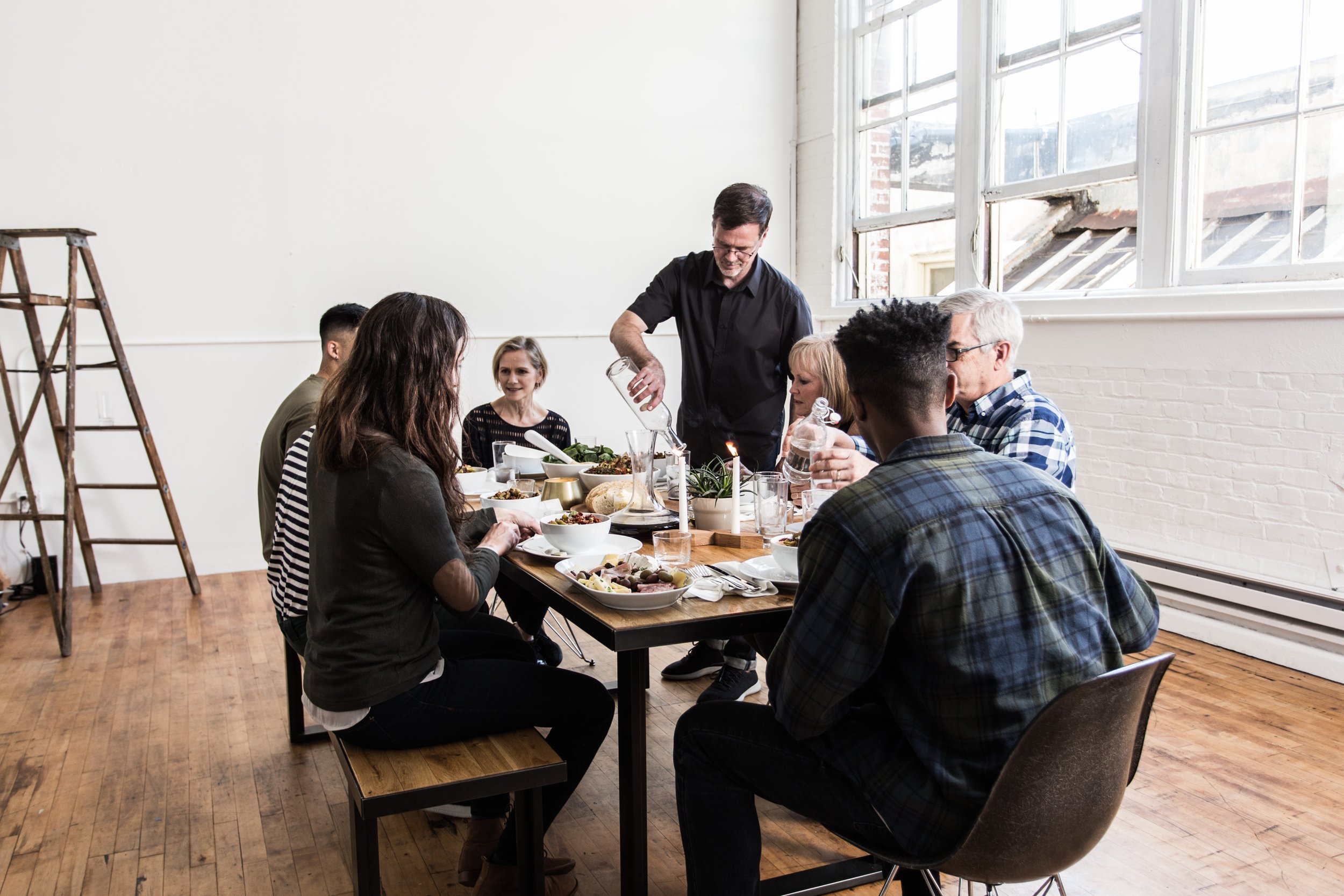
What is Bridgetown’s
small group model?
Thanks for expressing interest in how we at Bridgetown run our small group ministry – what we call Bridgetown Communities. We know you know this, but it’s worth saying again: it will not serve your church to plug-and-play what we do at Bridgetown. We’ve spent the last decade not coming up with new ideas, but contextualizing really old ones. “Community” is an ancient idea from God, not a modern church growth strategy. As you consider changing the way your church engages small group spiritual formation, we would encourage you to do it slowly and with your own congregation in mind. Our goal is to build programs that serve our people and their formation, and not the other way around.
That said, what follows is a quick overview of what we do, including some helpful attachments. We’ll do our best to keep these up to date, but, because we’re constantly trying to contextualize our model to best serve our church, we can’t guarantee everything here will always be current.
What is a Bridgetown Community?
A Bridgetown Community is a group of 10-15 people who are a part of Bridgetown Church, live in the same part of the city, and gather weekly to eat together, pray together, and practice the way of Jesus together. Our Communities are Bible and sermon application groups, based around the 9 Practices of Bridgetown’s Rule of Life. Because these groups exist for the purpose of communal spiritual formation, the baseline requirement for everyone in a Community is active discipleship to Jesus.
Each of our Communities are geographically organized and center around three primary identities: Discipleship (“practicing the way of Jesus”), Family (“together”), and Mission/Service (“in Portland”). In line with this, every Community follows the same monthly rhythm with autonomy to decide when each week happens:
Family (1 week): Once per month, each Community does something that builds their sense of belonging together. Whether it’s a prayer night, birthday celebration, dinner and a movie, picnic at the park, or something else, we believe that fun, shared time together is a necessary component to cultivating healthy discipleship.
Mission (1 week): Once per month, each Community spends time serving the city of Portland. We believe it is important that our discipleship moves us to the margins and that we remember that our formation is for the sake of others. Communities take spiritual responsibility for our city in any number of ways: serving with one of our Justice partners, wrapping around a local refugee or foster family, hosting a game night for our friends and family who don’t know Jesus, etc.
Discipleship (2 weeks): Twice per month, each Community works through the formation curriculum that we develop, called Community Guides. During each teaching series, our Communities engage one of the 9 Practices on our Rule of Life through this curriculum, working to integrate and establish rhythms for each. These Guides can be found within each teaching series on our website.
How does someone join a Community?
We require everyone who wants to join a Bridgetown Community to go through a class called Basics. Basics is a 2 week class that takes place three times a year. On two consecutive Sunday afternoons, participants will come to a 2 hour class that goes through our church's vision, leadership, orthodoxy and orthopraxy, structure of Community, Community Leadership, best practices for establishing healthy rhythms, Community Commitments, etc.
The week after the class, we send out a form asking people if they would like to be placed into a Community. Everyone who does is either put into an existing Community near them who needs more people, or—if there is not an existing Community who needs more people—we will start a new Community in their area.
Those starting a new Community will be connected with others over email, to gather in someone’s house and work through our four week long New Community Primer. During these four weeks, people will be walked through the logistical details of their Community (i.e. day of the week, time, how they want to do food, communication platform, integrating kids, etc.), a Family practice that helps them get to know each other, a Discipleship practice that walks them through a Community Guide on listening prayer, and a Mission practice that helps them pick a way to serve the city and get proximate to the poor.
They then email us a copy of the final page in that booklet, letting us know that they’ve finished their initial journey through the Primer and are ready to launch as an official Community. At this point, we contact the person(s) interested in leading this Community to invite them to fill out our Community Leader Application and to attend our Community Leader Training (more on both in the next section).
Who leads a Bridgetown Community?
We are really passionate about cultivating healthy Leaders for our Communities, so we’ll answer this question in two parts: initial training and ongoing training.
Initial Training: As the Community is going through the 4 week New Community Primer, they are establishing various roles and responsibilities (e.g. communication coordinator, meal coordinator, mission coordinator, etc.). By the end, our hope is that one or two people rise to the task of becoming the official Community Leader(s). We refer to our Community Leaders as frontline pastors of our church, which aptly describes their main role in their Community: to pastor. While our ideal is for each Community to be led by a woman and a man, it is ok if only one person or two men/women express interest. Men and women co-leading together is a fuller image of the imago Dei and allows the Leaders to navigate pastoral issues among those of the same gender.
Those interested in leading then fill out our Community Leader Application. One of the Community Pastors will then review the application and sit down with that Leader to walk through it (Kyle Major reviews and meets with the men and Natalie Correll reviews and meets with the women). The main goal of that meeting is to mutually discern whether or not this is the right season for this individual to step into Community leadership. If we don't think they are ready or in a good spot to lead, we will have a "not yet" conversation and give them an action plan with how we want to see them grow to be ready for leadership and resources for how they can do that.
A few weeks after the Communities finish their New Community Primer, we hold a New Leader Training. This Training covers a lot: what it means to be a frontline pastor, maintaining emotional and spiritual health for the Leader and the Community, how to navigate common issues in a Community, what ongoing training entails, Community Leader Commitments, etc.
Ongoing Training: One resource that we offer to‚ and require of, our Leaders is our Coaching Cohorts. These Cohorts happen once a month (with summers and December off) for two hours and exist to develop healthier Leaders as we focus on themes of both personal discipleship and practical Community leading strategies. Over these two hours each month, we spend time praying together, working through leadership development, doing some case studies together related to our content for the night (e.g. confronting sin, resourcing mental health crises, managing relational conflict, growing in pastoral care, setting healthy boundaries, etc.), and then the Leaders spend a good chunk of time in triads talking through the specific things they are working through as Community Leaders. Once or twice a year, instead of Cohort, we’ll invite some of our executive leadership to share with our Leaders about where the church is headed over the next 3–6 months and how they can help us get ready for that.
Thanks again for reaching out! We hope that you find all of this helpful.
Grace & Peace,
The Bridgetown Communities Team
